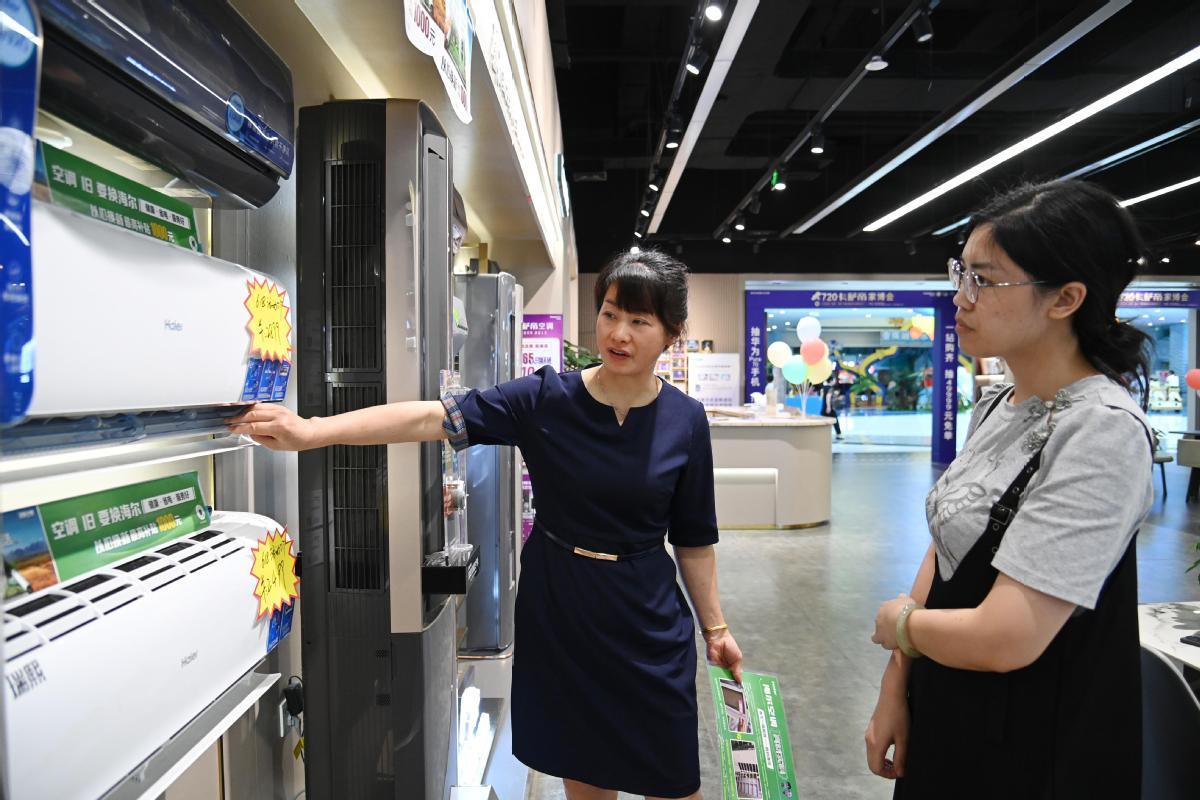
 0 Comment(s)
0 Comment(s) Print
Print E-mail China Daily, September 14, 2024
E-mail China Daily, September 14, 2024

A consumer (R) learns about trade-in plans for home appliances at a store in Chongqing in July. [Photo/China Daily]
China's latest efforts to promote trade-ins of home appliances will further stimulate consumer spending appetites, bolster consumption recovery and inject strong momentum into the country's economic growth, experts said.
They called for establishing mechanisms and industry standards for recycling, circulating and dismantling of aging and outdated household appliances. Meanwhile, Chinese home appliance enterprises should expand recycling channels and drive the popularization of green and intelligent products, they added.
Chinese home appliance manufacturer Hisense Group is intensifying efforts to provide trade-in subsidies and discounts to consumers who are willing to replace old appliances with energy-saving, intelligent and high-quality alternatives.
The company said apart from government subsidies, consumers could enjoy additional subsidies of up to 2,000 yuan ($280.9) for each item while purchasing from a diverse range of home appliances made by Hisense.
The Qingdao, Shandong province-based manufacturer is also stepping up its push to establish online and offline recycling and disposal channels for discarded home appliances. It has teamed up with Aihuishou, a major online electronics recycling platform, to encourage the replacement of outdated goods with newer and more advanced options.
The move comes after the authorities vowed to offer financial incentives to encourage consumers to replace their outdated home appliances with newer versions, as part of the country's efforts to expand domestic demand and bolster economic growth, according to a notice recently released by the Ministry of Commerce and three other government departments.
The notice said consumers who buy eight categories of home appliances such as refrigerators, washing machines, televisions, air conditioners and computers with high energy efficiency can enjoy trade-in subsidies. The subsidies will be 15 percent of the final sales price of the new products.
Each individual consumer can receive subsidies for one item in one category, and the subsidies for each item cannot exceed 2,000 yuan, the notice said. All local governments should coordinate the use of central and local funds to provide subsidies to individual consumers who buy these eight categories of home appliances with high energy efficiency, it added.
Guo Meide, president of Beijing-based market consultancy All View Cloud, said the latest policy measures to encourage consumer goods trade-ins — especially white goods — will provide a strong boost to high-end consumption as shoppers can enjoy steep discounts and subsidies when taking part in the program.
The move will not only unleash consumption demand for home appliances, but also drive technological advancement and product upgrades in emerging categories, as well as the green and smart transformation of the home appliance sector, Guo said.
Industry insiders said with intensified efforts to boost consumer goods trade-ins and the launch of various pro-consumption activities, China's consumer market is expected to gain growth momentum this year.
The Ministry of Commerce said trade-in sales of televisions, washing machines and refrigerators on major e-commerce platforms increased by 92.9 percent, 82.8 percent and 65.9 percent year-on-year, respectively, in July.
Gree Electric Appliances, a major Chinese home appliance manufacturer based in Zhuhai, Guangdong province, has announced plans to invest 3 billion yuan to promote trade-ins of consumer goods.
Gree said the specific measures will further improve the enthusiasm of users purchasing home appliances and help enrich the application scenarios of new technologies, while consumers can enjoy more cost-effective products with high quality.
The company has built six recycling bases for discarded home appliances and more than 30,000 offline recycling sites. By the end of 2023, Gree had recycled, dismantled and otherwise handled 56 million units of discarded electronic products, recycled 850,000 metric tons of metals such as copper, iron and aluminum, and reduced carbon emissions by 2.8 million tons.
The State Council, China's Cabinet, released an action plan in March to initiate large-scale equipment upgrades and trade-ins of consumer goods — nearly 15 years since the last such round of renewals.
As of the end of 2023, the number of household appliances in major categories such as refrigerators, washing machines and air conditioners had exceeded 3 billion units, which presents huge potential for renewal and replacement, said the Ministry of Commerce.
Zhu Keli, founding director of the China Institute of New Economy, said the implementation of trade-in policy measures regarding major consumer goods — especially home appliances and automobiles — is of great significance in effectively shoring up consumer confidence, unleashing domestic demand potential and revitalizing economic recovery.